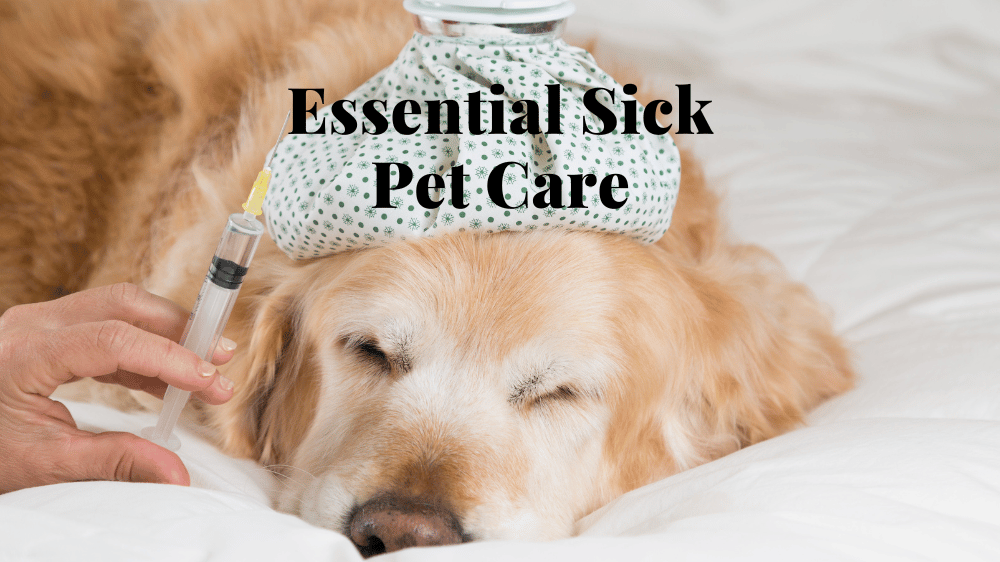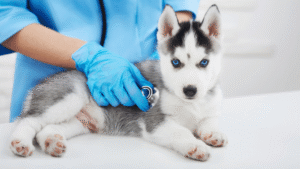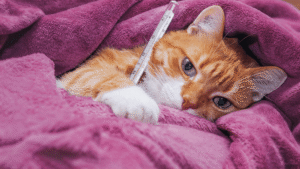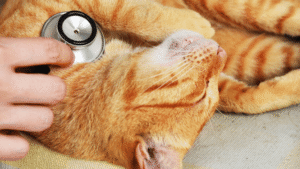When it comes to “sick pet care”, every pet parent wants to ensure their furry friend is well taken care of during their time of need. Whether you’re dealing with a sick cat or dog, understanding the sick pet symptoms early can make all the difference in their recovery.
From pet illness care to knowing when it’s time for veterinary care at home, this guide will provide you with essential tips and tricks to help your pet get back on their paws.
Understanding Sick Pet Symptoms: Early Signs to Watch For
Recognizing sick pet symptoms early is key to effective sick pet care. Pets are often masters at hiding their discomfort, making it even more crucial for you as a pet parent to stay vigilant and identify any signs of illness. Catching sick pet symptoms early on can make a world of difference in how quickly they recover.
Common sick pet symptoms to look out for include:
- Lethargy: If your pet is normally energetic and suddenly becomes inactive, it’s a clear indication that something is wrong. Lethargy is often one of the first sick pet symptoms that will require prompt “sick pet care”.
- Loss of appetite: A sudden drop in appetite, especially if it’s prolonged, is frequently one of the first signs that your pet is unwell. This is a common sick pet symptom that demands attention.
- Coughing, sneezing, or wheezing: Respiratory issues, such as persistent coughing or labored breathing, can indicate a respiratory infection. Sick pet care during these times may include soothing remedies or a visit to the vet.
- Vomiting or diarrhea: Digestive issues like vomiting or diarrhea are common in sick pets and can be caused by infections, toxins, or other health problems. Providing proper “sick pet care” during these symptoms can help alleviate discomfort.
The key to how to care for sick pets is noticing these sick pet symptoms early and responding accordingly. If your pet exhibits any of these signs, it’s important to act quickly.
For minor issues like a mild cold or upset stomach, home remedies for sick pets can provide relief, but more severe symptoms may require immediate veterinary intervention.
Pet Health Recovery: Steps for a Speedy Recovery
Helping your pet through “sick pet care” and pet health recovery involves more than just treating symptoms; it’s about ensuring their body has everything it needs to heal properly. Here are some essential steps to boost your pet’s recovery and ensure they stay on track:
1.Maintain a Healthy Diet
After your pet starts feeling better, it’s crucial to reintroduce regular meals. Focus on high-quality food that’s gentle on their stomach, especially if they’ve had digestive issues.
For pets with fever or flu, pet fever treatment may include soft, nutritious meals to help them regain strength and support their sick pet care. A proper diet aids in pet health recovery and ensures they regain their energy.
2.Natural Healing Remedies
Many pet parents seek natural methods to treat a sick pet naturally. While not a substitute for professional care, natural remedies like chamomile tea (for relaxation) or ginger (to help with nausea) can offer comfort.
These remedies should only be used after consulting your vet. Always ensure that any sick pet care you provide doesn’t interfere with prescribed treatments.
3.Rest and Gradual Return to Activity
As your pet begins to feel better, make sure to keep their exercise light and gradual. Overexertion too soon can slow down their pet health recovery.
Caring for a sick dog/cat during the recovery phase requires carefully monitoring their energy levels and making sure they don’t push themselves too hard. Providing a calm, quiet environment is crucial to “sick pet care”.
By following these pet recovery tips, you’ll ensure that your pet is on the path to recovery in no time. From natural remedies to learning how to manage a pet’s illness, these actions ensure that your pet is getting the best “sick pet care” possible and a safe return to full health.
Managing Pet Health Issues: Preventing Further Complications
Once your pet has started recovering from an illness, it’s important to focus on preventing pet health issues and ensuring they don’t face any further complications. Here are some essential pet recovery tips to manage your pet’s health and avoid relapse:
1.Avoid Secondary Infections
Pets with compromised immune systems or recovering from illness are at a higher risk of secondary infections. During the sick pet care phase, ensure they stay away from other sick animals, as exposure to new pathogens can delay their recovery.
Keeping your pet indoors until they’ve fully recovered is crucial for preventing pet health issues and helping them regain their strength.
2.Pay Attention to New Symptoms
Watch for any changes in your pet’s behavior or appetite after their illness. A sudden shift could signal a secondary infection that requires immediate attention. Prompt detection and sick pet care can prevent the issue from worsening, ensuring that your pet’s recovery remains on track.
3.Importance of Follow-up Care
After treating your pet’s illness, it’s crucial to schedule a follow-up appointment with your vet. These check-ups help assess your pet’s overall health and progress.
Your vet can offer advice on how to manage a pet’s illness moving forward, recommend further treatments if needed, and confirm that your pet is fully healed. Consistent follow-up care is an essential part of “sick pet care” that helps prevent the recurrence of illness.
4.Maintaining a Healthy Lifestyle
A healthy diet, regular exercise, and maintaining a low-stress environment are key to ensuring your pet stays healthy after recovery. Preventing pet health issues is possible when your pet is well-nourished, mentally stimulated, and physically fit. Regular check-ups and a balanced routine help support your pet’s overall well-being.
By following these pet recovery tips and working closely with your vet, you can ensure that your pet stays healthy, avoids complications, and enjoys a long, happy life. Remember, preventing pet health issues through proactive care is the best way to keep your furry friend in top shape!
Table: Common Pet Illnesses and Their Symptoms
| Pet Illness | Common Symptoms | Home Care Tips | When to Visit a Vet |
| Dog Cold/Flu |
Sneezing, coughing, runny nose |
Keep warm, hydrate, mild exercise |
No improvement after 3 days, labored breathing |
| Cat Vomiting |
Frequent vomiting, lethargy |
Small meals, hydrated, bland food |
Persistent vomiting, blood in vomit |
| Dog Diarrhea |
Loose stool, lethargy, vomiting |
Keep hydrated, bland food, monitor stool |
Vomiting with diarrhea, dehydration signs |
| Cat Skin Infections |
Red, itchy skin, hair loss |
Medicated baths, monitor symptoms |
No improvement, worsening condition |
Conclusion
In this guide, we’ve covered the essential aspects of “sick pet care”, including how to spot sick pet symptoms, treat common illnesses, and provide comfort and support during your pet’s recovery. Remember, early intervention is key to a successful recovery.
If your pet shows signs of illness, it’s crucial to act fast and provide them with the proper care, whether at home or through professional veterinary care at home. Make sure you follow these important pet recovery tips.
Always keep an eye on your pet’s condition, and if symptoms worsen or don’t improve, don’t hesitate to seek professional assistance. A healthy pet starts with a caring owner who stays proactive in maintaining their wellness.
If you’re unsure about your pet’s health or need personalized advice or pet recovery tips designed for your pets specifically, consult a veterinarian for the tailored guidance and treatments to ensure your pet’s well-being.
FAQs about Sick Pet Care
What should I do if my pet is vomiting and seems lethargic?
If your dog or cat is vomiting and lethargic, there is no time to lose. In the moment, it’s all about keeping your pet hydrated to avoid dehydration. Give small volumes of water or electrolyte drink. Keep a close eye on them.
And if symptoms persist beyond a day or become worse over time, consult your vet right away. vomiting and lethargy can be caused by a number of things, and a vet visit is a must to diagnose and treat the the problem appropriately.
May I treat my pet at home?
You can’t do much about COVID-19 at home, but it’s still possible to treat mild symptoms with simple remedies and plenty of monitoring. For instance, home remedies for sick pets, such as bland food or herbal teas can soothe your pet’s stomach.
But if the symptoms are acute or if they do not resolve after a few days, it’s important to take your dog to the vet. Pet health care and personal care with professional consultation about pet health is recommended for other conditions.
How can I tell if my pet is running a fever?
If you have noticed your pet is feverish, signs to look for include warm ears, warm nose, warm paws, lack of appetite and overall lethargy. To be sure, you could use a pet thermometer.
A popular treatment for pet fever is to give them fluids to ensure they are well-hydrated. Group://27277/page/3936″>Be sure to contact your vet sugar immediately if Pet fever is cured:When the fever lasts for over 24 hours, or is accompanied by other severe symptoms, it is time to visit your vet and discover the cause.
Can I use home remedies for my pet’s health issues?
But some home remedies to care for sick pets do work, especially for mild stomach upset or congestion. Still, refer to your veterinarian before attempting any natural remedies and use caution.
Several plants, herbs and over-the-counter remedies could prove poisonous to pets if used incorrectly. Holistically treating a sick pet involves selecting the right remedies and seeking professional help to ensure that those remedies do not inflict more harm than good.
How can I protect my pet?
An ounce of prevention is better than a pound of cure. To avoid the vet, keep your pet in tip-top condition with regular check-us, a balanced diet and lots of play.
Preventing exposure of your pet to ailing animals, keeping them in good sanitary conditions, and ensuring all vaccinations are current are all methods of lowering chances.






